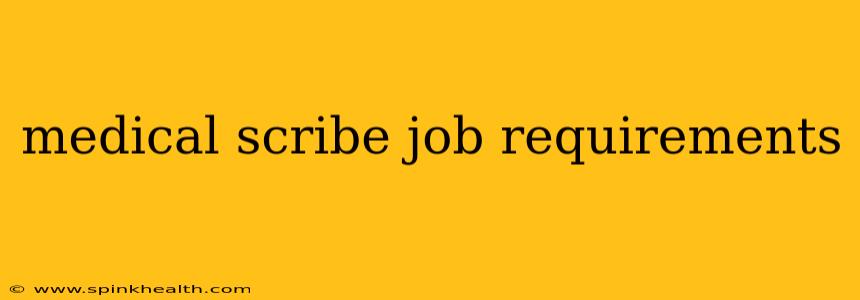Decoding the Medical Scribe Job Requirements: A Journey into the World of Healthcare Documentation
The rhythmic tap-tap-tap of a keyboard, the hushed concentration in a bustling exam room, the satisfaction of meticulously documenting a patient's story – this is the life of a medical scribe. But what does it really take to land one of these increasingly sought-after positions? Let's unravel the mysteries behind medical scribe job requirements.
It all started with Dr. Ramirez, a seasoned physician perpetually battling the mountain of paperwork threatening to bury him under its weight. He was frustrated, exhausted, and felt he was losing precious time he could be spending with patients. Then, Sarah, a recent graduate with a keen eye for detail and a lightning-fast typing speed, walked into his life. She became his scribe, transforming his workflow and allowing him to focus on what mattered most: patient care. This is where the demand for medical scribes exploded.
This story illustrates the core need that fuels the demand: efficient documentation. Let’s explore the common requirements potential scribes need to know.
What are the Typical Medical Scribe Job Requirements?
While specific requirements can vary depending on the healthcare facility (hospital, clinic, etc.) and specialty (cardiology, orthopedics, family medicine, etc.), several common threads weave through most job descriptions.
1. Typing Speed and Accuracy: This is arguably the most crucial aspect. You'll be transcribing medical information at a rapid pace, often under pressure. Most employers seek candidates who can type at least 60 words per minute (WPM) with high accuracy (minimal errors).
2. Medical Terminology Knowledge: Understanding medical terms is vital for accurately documenting patient encounters. Prior experience in a healthcare setting or formal medical terminology training is often preferred.
3. Electronic Health Record (EHR) Systems Proficiency: Many facilities utilize specific EHR systems (e.g., Epic, Cerner). Familiarity or experience with these systems is usually a significant plus. Some postings even require demonstrable proficiency.
4. Strong Attention to Detail and Accuracy: Mistakes in medical documentation can have serious consequences. Accuracy is paramount. The ability to meticulously capture every detail while maintaining speed is highly valued.
5. Excellent Listening and Comprehension Skills: You'll need to listen attentively to physicians, extract relevant information, and quickly translate it into accurate documentation.
6. Professionalism and Discretion: Scribes work in sensitive environments where patient confidentiality is paramount. Maintaining a professional demeanor and upholding patient privacy is essential.
7. Computer Skills: Beyond typing, comfortable navigation of various software applications is a must.
8. Education and Experience: While a college degree isn't always mandatory, many employers prefer candidates with at least a high school diploma or equivalent. Relevant experience (e.g., healthcare assistant, administrative assistant) can be a substantial advantage.
What Education or Training is Needed to Become a Medical Scribe?
While some scribes enter the field with only a high school diploma and a fast typing speed, obtaining additional training can significantly improve your chances.
- Medical Terminology Courses: These courses provide a structured introduction to medical terminology, improving your understanding and efficiency.
- EHR Training: Familiarizing yourself with commonly used EHR systems can give you a competitive edge.
- Certified Medical Scribe Programs: Some organizations offer certification programs designed to provide comprehensive training in medical scribing skills.
What are the Different Types of Medical Scribe Jobs?
In-patient Scribes: These scribes work directly with physicians in hospital settings, documenting patient encounters, procedures, and progress notes.
Out-patient Scribes: These scribes work in clinics and doctor's offices, supporting physicians with patient documentation in a less intensive setting.
Specialty-Specific Scribes: Some scribes specialize in a particular area of medicine, such as cardiology, orthopedics, or emergency medicine. This requires deeper knowledge of that specific area's terminology and procedures.
How Much Do Medical Scribes Make?
The salary for medical scribes varies widely based on location, experience, employer type, and specialty. It's wise to research average salaries in your area before applying.
This journey into the world of medical scribe job requirements highlights the vital role these professionals play in today’s healthcare system. It's a career demanding accuracy, speed, and a dedication to patient care—a career that offers a rewarding blend of challenge and contribution. For those with the right skills and passion, the path to becoming a successful medical scribe can be both fulfilling and lucrative.

